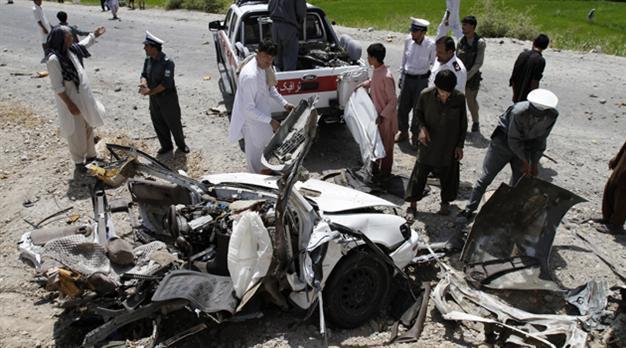Afghan suicide attacks kill 36: officials
KANDAHAR, Afghanistan - Agence France-Presse

Afghans look at the wreckage of a vehicle after a roadside explosion on the outskirts of Laghman province east of Kabul, Afghanistan, Sunday, Aug. 12, 2011. AP photo
Suicide bombers killed 36 people today, mostly civilians shopping for Eid celebrations, in the capital of Afghanistan's Nimroz province on the border with Iran, officials said.The attack on Zaranj city is the biggest in recent memory in the relatively peaceful province and one of the deadliest anywhere in the war-torn country this year. At least 66 people were injured.
Three suicide attackers out of an original group of 11 blew themselves up in separate areas of the city, one outside a hospital, police said.
"This was a group of 11 attackers who wanted to conduct simultaneous attacks across the city," deputy provincial police chief Mujibullah Latifi told AFP.
"Security forces killed two of the suicide attackers last night and detained three others this morning. Three managed to detonate themselves while three others were gunned down.
"We have a lot of civilian casualties because two of the attackers detonated themselves near a bazaar where many people had gathered to do shopping for Eid", the Muslim celebration at the end of the fasting month of Ramadan, he said.
"We have confirmation that 21 civilians and 15 members of the security forces have been killed in these attacks and more than 66 others injured," provincial governor Abdul Karim Brahawi told AFP.
There was no immediate claim of responsibility, but similar attacks are usually blamed on Taliban insurgents fighting to overthrow the Western-backed government of President Hamid Karzai.
The attack in the normally peaceful province comes after 11 Afghan policemen were killed there on Saturday when one of their colleagues, believed to be a Taliban infiltrator, opened fire on them.
That incident, in Delaram district of Nimroz, was the latest in a series of shootings in which members of the Afghan security forces have targeted local and foreign colleagues.
A day earlier, three American soldiers were shot dead by an Afghan policeman who invited them to a meal in Helmand province. Three other troops were killed by an Afghan civilian employed on a NATO base in the same province.
Green-on-blue attacks, in which Afghans turn their weapons against their foreign allies, have killed a total of 37 international soldiers this year, according to a NATO count.
But Afghan troops and police have also come under increasing pressure as they take over more responsibility for security as NATO troops prepare to leave the country.
And civilians continue to bear the brunt of the war.
The United Nations said 1,145 Afghan non-combatants lost their lives, mostly in Taliban and other insurgent attacks, between January 1 and June 30 this year. Last year, a record 3,021 civilians died.
The spread of violence to Nimroz will add to growing concerns over the country's future once some 130,000 NATO troops withdraw as planned by the end of 2014, handing responsibility for security to Afghan forces.
Western politicians keen to get their troops out of an increasingly unpopular war regularly talk up the ability of the Afghan army and police to cope on their own, but there is widespread fear of a multi-factional civil war once they leave.
















